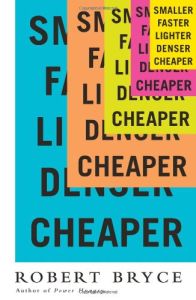Join getAbstract to access the summary!

Join getAbstract to access the summary!
Robert Bryce
Smaller Faster Lighter Denser Cheaper
How Innovation Keeps Proving the Catastrophists Wrong
Public Affairs, 2014
What's inside?
The world of “Smaller Faster Lighter Denser Cheaper” enables longer life, more food, less poverty, greater education and constant innovation.
Recommendation
Manhattan Institute fellow Robert Bryce’s personal, idiosyncratic style fuels an important argument. He celebrates innovation, technology and freedom as the answers to environmental concerns, repeatedly illustrating potential solutions that many of those forecasting climate calamity don’t mention, while suggesting what humanity’s future could and should be. In this urgent if reductive treatise, he proves an eccentric contrarian. His sort of random capitalization – things aren’t faster, they are Faster – can irritate, and rather than answer objections or counterarguments, Bryce tends to just elude them, but he consistently remains intriguing. While always neutral politically, getAbstract suggests Bryce’s optimistic look ahead to all those interested in the environment, the future and how innovation builds on itself.
Summary
About the Author
Robert Bryce, a senior fellow at the Manhattan Institute, also wrote Power Hungry, Gusher of Lies, Pipe Dreams and other works on the energy industry.


















Comment on this summary